BCO3442 Information Ethics: Argumentative Essay on Internet Freedom
VerifiedAdded on 2023/06/12
|10
|2886
|401
Essay
AI Summary
This argumentative essay delves into the complex issue of internet content restrictions and their impact on freedom of speech. It presents arguments for and against such restrictions, examining aspects like television commercials, trolling, child pornography, age restrictions, weapon content, and the widening of social gaps. The essay also considers the costs associated with implementing internet censorship and concludes by emphasizing the importance of education and protection mechanisms over strict limitations, suggesting that these are more effective in safeguarding society and children from potential harm. This document is available on Desklib, a platform offering a range of study tools and resources for students.
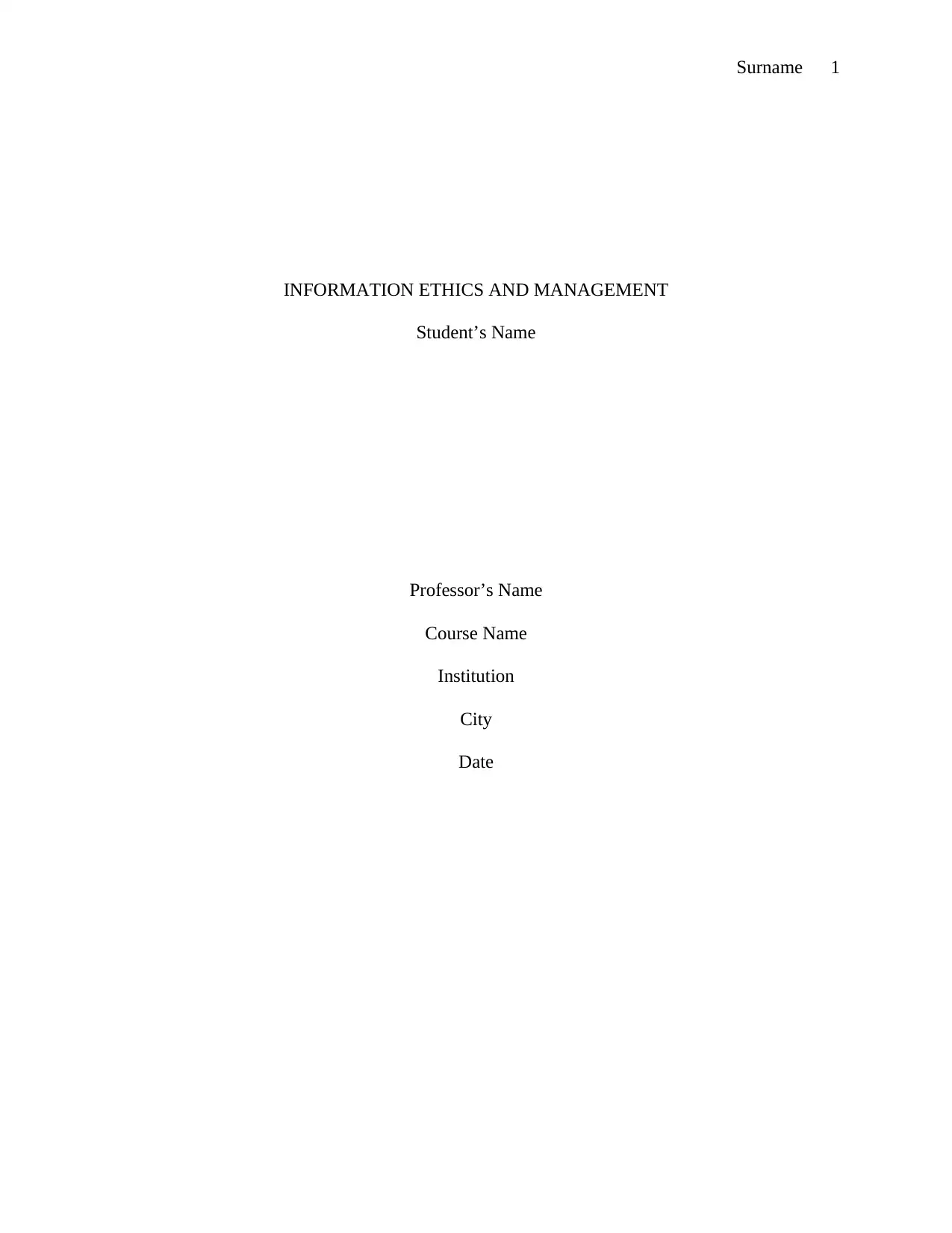
Surname 1
INFORMATION ETHICS AND MANAGEMENT
Student’s Name
Professor’s Name
Course Name
Institution
City
Date
INFORMATION ETHICS AND MANAGEMENT
Student’s Name
Professor’s Name
Course Name
Institution
City
Date
Paraphrase This Document
Need a fresh take? Get an instant paraphrase of this document with our AI Paraphraser
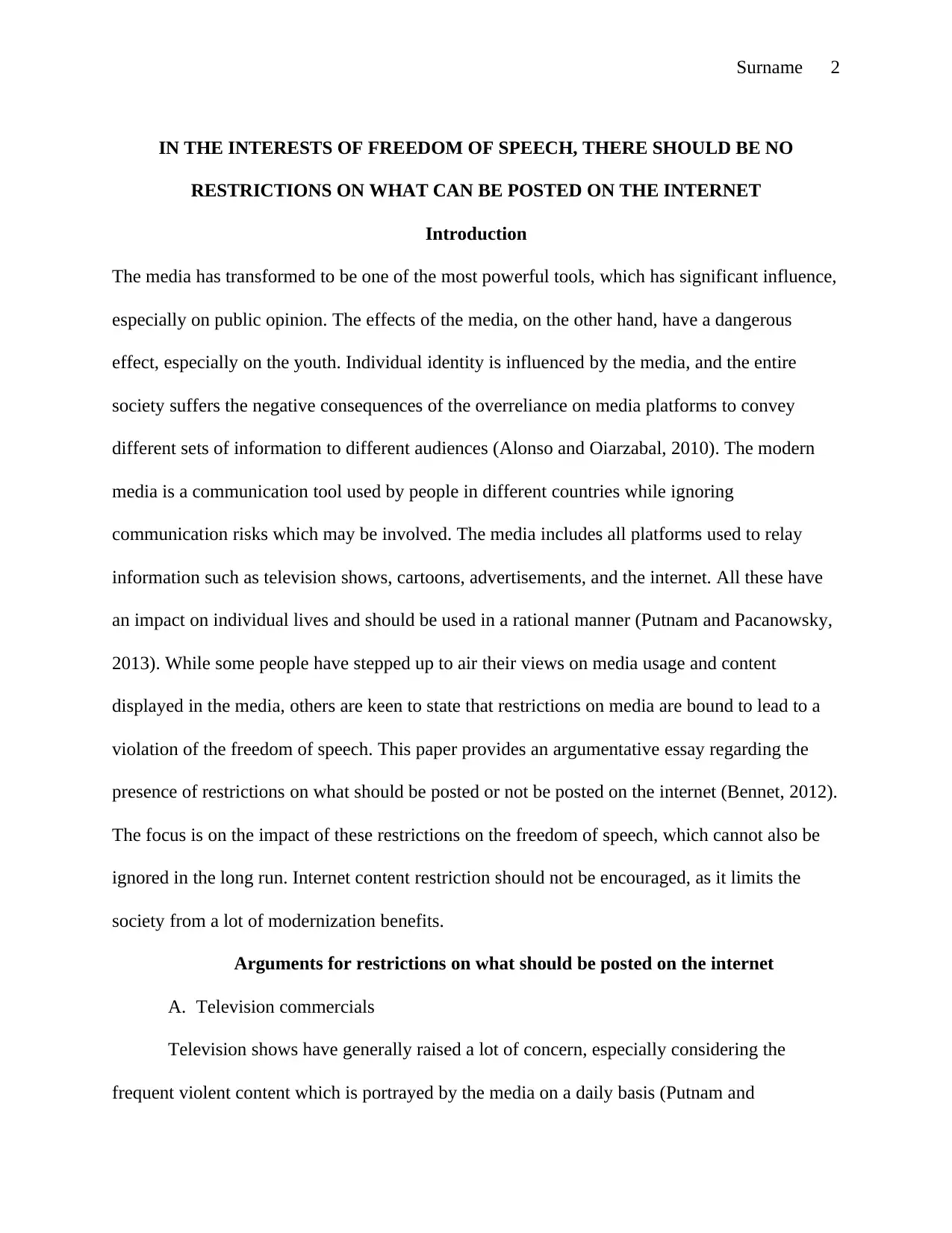
Surname 2
IN THE INTERESTS OF FREEDOM OF SPEECH, THERE SHOULD BE NO
RESTRICTIONS ON WHAT CAN BE POSTED ON THE INTERNET
Introduction
The media has transformed to be one of the most powerful tools, which has significant influence,
especially on public opinion. The effects of the media, on the other hand, have a dangerous
effect, especially on the youth. Individual identity is influenced by the media, and the entire
society suffers the negative consequences of the overreliance on media platforms to convey
different sets of information to different audiences (Alonso and Oiarzabal, 2010). The modern
media is a communication tool used by people in different countries while ignoring
communication risks which may be involved. The media includes all platforms used to relay
information such as television shows, cartoons, advertisements, and the internet. All these have
an impact on individual lives and should be used in a rational manner (Putnam and Pacanowsky,
2013). While some people have stepped up to air their views on media usage and content
displayed in the media, others are keen to state that restrictions on media are bound to lead to a
violation of the freedom of speech. This paper provides an argumentative essay regarding the
presence of restrictions on what should be posted or not be posted on the internet (Bennet, 2012).
The focus is on the impact of these restrictions on the freedom of speech, which cannot also be
ignored in the long run. Internet content restriction should not be encouraged, as it limits the
society from a lot of modernization benefits.
Arguments for restrictions on what should be posted on the internet
A. Television commercials
Television shows have generally raised a lot of concern, especially considering the
frequent violent content which is portrayed by the media on a daily basis (Putnam and
IN THE INTERESTS OF FREEDOM OF SPEECH, THERE SHOULD BE NO
RESTRICTIONS ON WHAT CAN BE POSTED ON THE INTERNET
Introduction
The media has transformed to be one of the most powerful tools, which has significant influence,
especially on public opinion. The effects of the media, on the other hand, have a dangerous
effect, especially on the youth. Individual identity is influenced by the media, and the entire
society suffers the negative consequences of the overreliance on media platforms to convey
different sets of information to different audiences (Alonso and Oiarzabal, 2010). The modern
media is a communication tool used by people in different countries while ignoring
communication risks which may be involved. The media includes all platforms used to relay
information such as television shows, cartoons, advertisements, and the internet. All these have
an impact on individual lives and should be used in a rational manner (Putnam and Pacanowsky,
2013). While some people have stepped up to air their views on media usage and content
displayed in the media, others are keen to state that restrictions on media are bound to lead to a
violation of the freedom of speech. This paper provides an argumentative essay regarding the
presence of restrictions on what should be posted or not be posted on the internet (Bennet, 2012).
The focus is on the impact of these restrictions on the freedom of speech, which cannot also be
ignored in the long run. Internet content restriction should not be encouraged, as it limits the
society from a lot of modernization benefits.
Arguments for restrictions on what should be posted on the internet
A. Television commercials
Television shows have generally raised a lot of concern, especially considering the
frequent violent content which is portrayed by the media on a daily basis (Putnam and
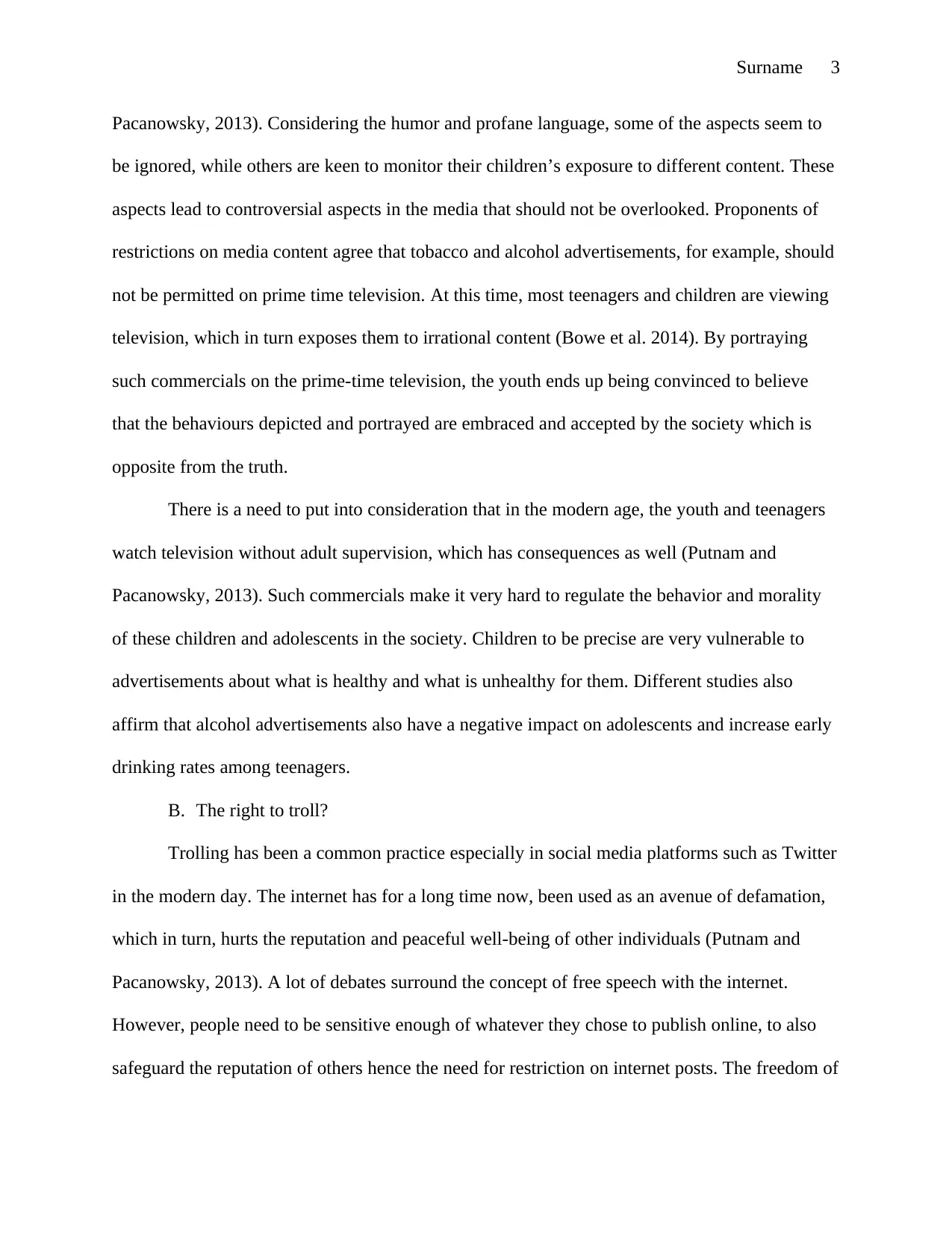
Surname 3
Pacanowsky, 2013). Considering the humor and profane language, some of the aspects seem to
be ignored, while others are keen to monitor their children’s exposure to different content. These
aspects lead to controversial aspects in the media that should not be overlooked. Proponents of
restrictions on media content agree that tobacco and alcohol advertisements, for example, should
not be permitted on prime time television. At this time, most teenagers and children are viewing
television, which in turn exposes them to irrational content (Bowe et al. 2014). By portraying
such commercials on the prime-time television, the youth ends up being convinced to believe
that the behaviours depicted and portrayed are embraced and accepted by the society which is
opposite from the truth.
There is a need to put into consideration that in the modern age, the youth and teenagers
watch television without adult supervision, which has consequences as well (Putnam and
Pacanowsky, 2013). Such commercials make it very hard to regulate the behavior and morality
of these children and adolescents in the society. Children to be precise are very vulnerable to
advertisements about what is healthy and what is unhealthy for them. Different studies also
affirm that alcohol advertisements also have a negative impact on adolescents and increase early
drinking rates among teenagers.
B. The right to troll?
Trolling has been a common practice especially in social media platforms such as Twitter
in the modern day. The internet has for a long time now, been used as an avenue of defamation,
which in turn, hurts the reputation and peaceful well-being of other individuals (Putnam and
Pacanowsky, 2013). A lot of debates surround the concept of free speech with the internet.
However, people need to be sensitive enough of whatever they chose to publish online, to also
safeguard the reputation of others hence the need for restriction on internet posts. The freedom of
Pacanowsky, 2013). Considering the humor and profane language, some of the aspects seem to
be ignored, while others are keen to monitor their children’s exposure to different content. These
aspects lead to controversial aspects in the media that should not be overlooked. Proponents of
restrictions on media content agree that tobacco and alcohol advertisements, for example, should
not be permitted on prime time television. At this time, most teenagers and children are viewing
television, which in turn exposes them to irrational content (Bowe et al. 2014). By portraying
such commercials on the prime-time television, the youth ends up being convinced to believe
that the behaviours depicted and portrayed are embraced and accepted by the society which is
opposite from the truth.
There is a need to put into consideration that in the modern age, the youth and teenagers
watch television without adult supervision, which has consequences as well (Putnam and
Pacanowsky, 2013). Such commercials make it very hard to regulate the behavior and morality
of these children and adolescents in the society. Children to be precise are very vulnerable to
advertisements about what is healthy and what is unhealthy for them. Different studies also
affirm that alcohol advertisements also have a negative impact on adolescents and increase early
drinking rates among teenagers.
B. The right to troll?
Trolling has been a common practice especially in social media platforms such as Twitter
in the modern day. The internet has for a long time now, been used as an avenue of defamation,
which in turn, hurts the reputation and peaceful well-being of other individuals (Putnam and
Pacanowsky, 2013). A lot of debates surround the concept of free speech with the internet.
However, people need to be sensitive enough of whatever they chose to publish online, to also
safeguard the reputation of others hence the need for restriction on internet posts. The freedom of
⊘ This is a preview!⊘
Do you want full access?
Subscribe today to unlock all pages.

Trusted by 1+ million students worldwide
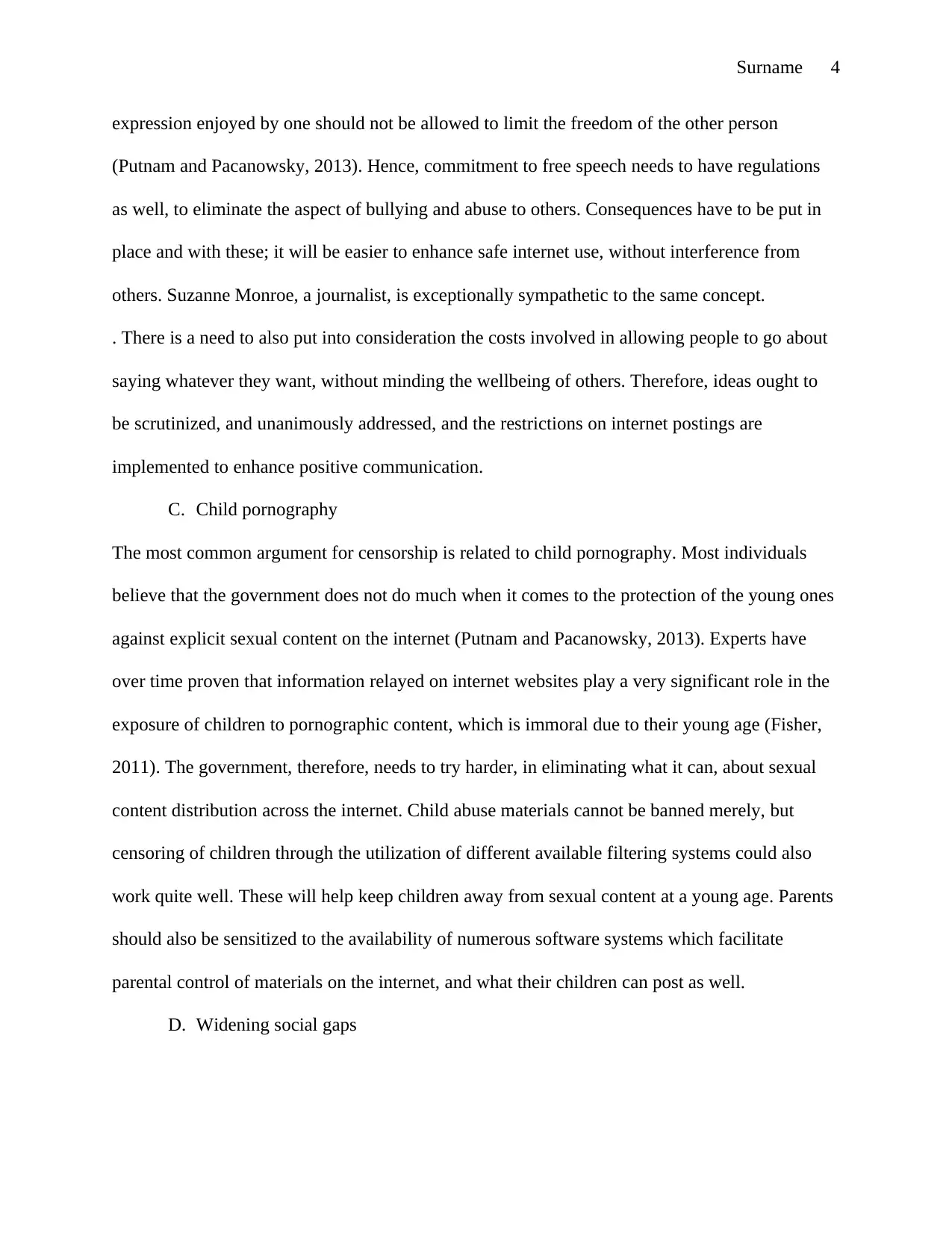
Surname 4
expression enjoyed by one should not be allowed to limit the freedom of the other person
(Putnam and Pacanowsky, 2013). Hence, commitment to free speech needs to have regulations
as well, to eliminate the aspect of bullying and abuse to others. Consequences have to be put in
place and with these; it will be easier to enhance safe internet use, without interference from
others. Suzanne Monroe, a journalist, is exceptionally sympathetic to the same concept.
. There is a need to also put into consideration the costs involved in allowing people to go about
saying whatever they want, without minding the wellbeing of others. Therefore, ideas ought to
be scrutinized, and unanimously addressed, and the restrictions on internet postings are
implemented to enhance positive communication.
C. Child pornography
The most common argument for censorship is related to child pornography. Most individuals
believe that the government does not do much when it comes to the protection of the young ones
against explicit sexual content on the internet (Putnam and Pacanowsky, 2013). Experts have
over time proven that information relayed on internet websites play a very significant role in the
exposure of children to pornographic content, which is immoral due to their young age (Fisher,
2011). The government, therefore, needs to try harder, in eliminating what it can, about sexual
content distribution across the internet. Child abuse materials cannot be banned merely, but
censoring of children through the utilization of different available filtering systems could also
work quite well. These will help keep children away from sexual content at a young age. Parents
should also be sensitized to the availability of numerous software systems which facilitate
parental control of materials on the internet, and what their children can post as well.
D. Widening social gaps
expression enjoyed by one should not be allowed to limit the freedom of the other person
(Putnam and Pacanowsky, 2013). Hence, commitment to free speech needs to have regulations
as well, to eliminate the aspect of bullying and abuse to others. Consequences have to be put in
place and with these; it will be easier to enhance safe internet use, without interference from
others. Suzanne Monroe, a journalist, is exceptionally sympathetic to the same concept.
. There is a need to also put into consideration the costs involved in allowing people to go about
saying whatever they want, without minding the wellbeing of others. Therefore, ideas ought to
be scrutinized, and unanimously addressed, and the restrictions on internet postings are
implemented to enhance positive communication.
C. Child pornography
The most common argument for censorship is related to child pornography. Most individuals
believe that the government does not do much when it comes to the protection of the young ones
against explicit sexual content on the internet (Putnam and Pacanowsky, 2013). Experts have
over time proven that information relayed on internet websites play a very significant role in the
exposure of children to pornographic content, which is immoral due to their young age (Fisher,
2011). The government, therefore, needs to try harder, in eliminating what it can, about sexual
content distribution across the internet. Child abuse materials cannot be banned merely, but
censoring of children through the utilization of different available filtering systems could also
work quite well. These will help keep children away from sexual content at a young age. Parents
should also be sensitized to the availability of numerous software systems which facilitate
parental control of materials on the internet, and what their children can post as well.
D. Widening social gaps
Paraphrase This Document
Need a fresh take? Get an instant paraphrase of this document with our AI Paraphraser
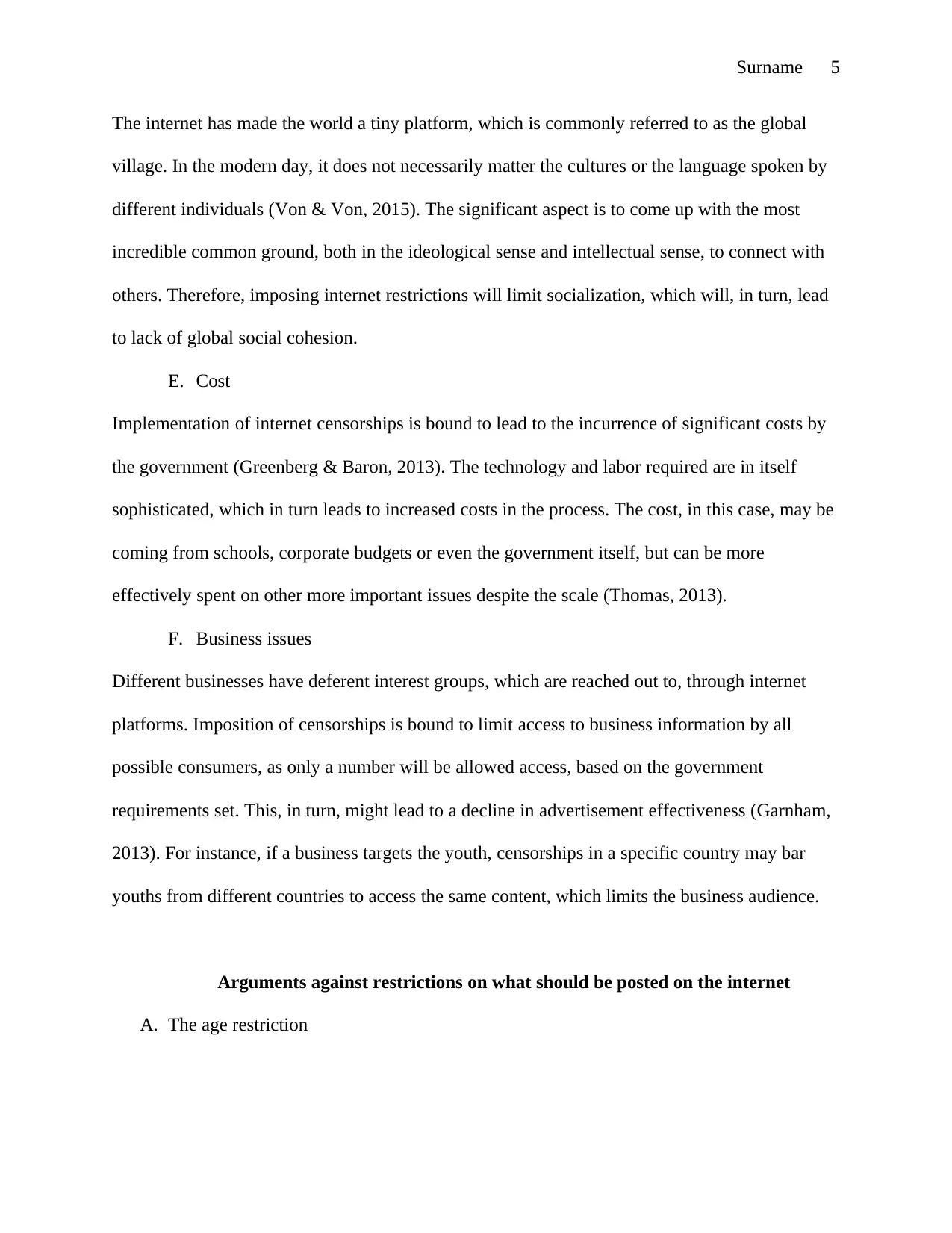
Surname 5
The internet has made the world a tiny platform, which is commonly referred to as the global
village. In the modern day, it does not necessarily matter the cultures or the language spoken by
different individuals (Von & Von, 2015). The significant aspect is to come up with the most
incredible common ground, both in the ideological sense and intellectual sense, to connect with
others. Therefore, imposing internet restrictions will limit socialization, which will, in turn, lead
to lack of global social cohesion.
E. Cost
Implementation of internet censorships is bound to lead to the incurrence of significant costs by
the government (Greenberg & Baron, 2013). The technology and labor required are in itself
sophisticated, which in turn leads to increased costs in the process. The cost, in this case, may be
coming from schools, corporate budgets or even the government itself, but can be more
effectively spent on other more important issues despite the scale (Thomas, 2013).
F. Business issues
Different businesses have deferent interest groups, which are reached out to, through internet
platforms. Imposition of censorships is bound to limit access to business information by all
possible consumers, as only a number will be allowed access, based on the government
requirements set. This, in turn, might lead to a decline in advertisement effectiveness (Garnham,
2013). For instance, if a business targets the youth, censorships in a specific country may bar
youths from different countries to access the same content, which limits the business audience.
Arguments against restrictions on what should be posted on the internet
A. The age restriction
The internet has made the world a tiny platform, which is commonly referred to as the global
village. In the modern day, it does not necessarily matter the cultures or the language spoken by
different individuals (Von & Von, 2015). The significant aspect is to come up with the most
incredible common ground, both in the ideological sense and intellectual sense, to connect with
others. Therefore, imposing internet restrictions will limit socialization, which will, in turn, lead
to lack of global social cohesion.
E. Cost
Implementation of internet censorships is bound to lead to the incurrence of significant costs by
the government (Greenberg & Baron, 2013). The technology and labor required are in itself
sophisticated, which in turn leads to increased costs in the process. The cost, in this case, may be
coming from schools, corporate budgets or even the government itself, but can be more
effectively spent on other more important issues despite the scale (Thomas, 2013).
F. Business issues
Different businesses have deferent interest groups, which are reached out to, through internet
platforms. Imposition of censorships is bound to limit access to business information by all
possible consumers, as only a number will be allowed access, based on the government
requirements set. This, in turn, might lead to a decline in advertisement effectiveness (Garnham,
2013). For instance, if a business targets the youth, censorships in a specific country may bar
youths from different countries to access the same content, which limits the business audience.
Arguments against restrictions on what should be posted on the internet
A. The age restriction
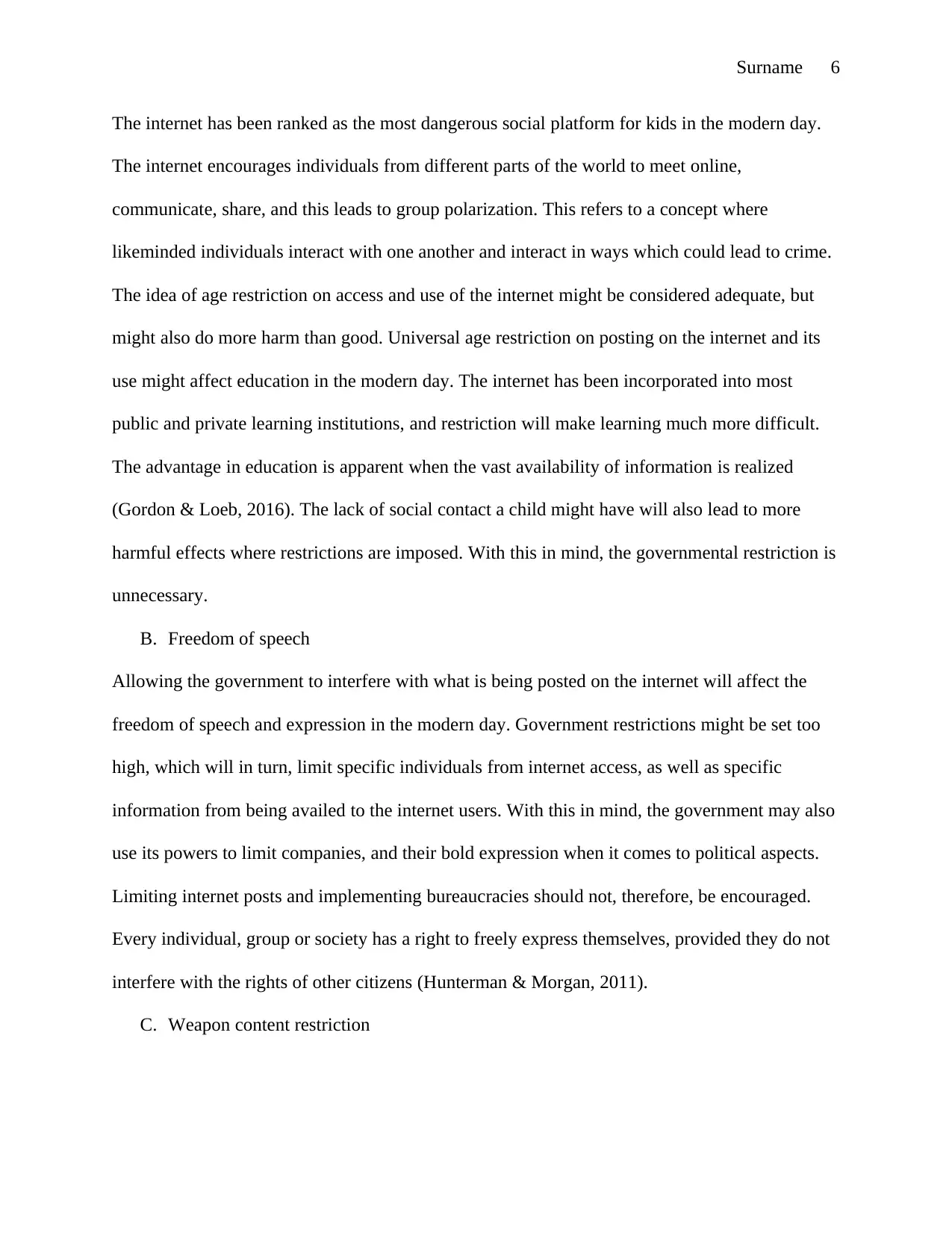
Surname 6
The internet has been ranked as the most dangerous social platform for kids in the modern day.
The internet encourages individuals from different parts of the world to meet online,
communicate, share, and this leads to group polarization. This refers to a concept where
likeminded individuals interact with one another and interact in ways which could lead to crime.
The idea of age restriction on access and use of the internet might be considered adequate, but
might also do more harm than good. Universal age restriction on posting on the internet and its
use might affect education in the modern day. The internet has been incorporated into most
public and private learning institutions, and restriction will make learning much more difficult.
The advantage in education is apparent when the vast availability of information is realized
(Gordon & Loeb, 2016). The lack of social contact a child might have will also lead to more
harmful effects where restrictions are imposed. With this in mind, the governmental restriction is
unnecessary.
B. Freedom of speech
Allowing the government to interfere with what is being posted on the internet will affect the
freedom of speech and expression in the modern day. Government restrictions might be set too
high, which will in turn, limit specific individuals from internet access, as well as specific
information from being availed to the internet users. With this in mind, the government may also
use its powers to limit companies, and their bold expression when it comes to political aspects.
Limiting internet posts and implementing bureaucracies should not, therefore, be encouraged.
Every individual, group or society has a right to freely express themselves, provided they do not
interfere with the rights of other citizens (Hunterman & Morgan, 2011).
C. Weapon content restriction
The internet has been ranked as the most dangerous social platform for kids in the modern day.
The internet encourages individuals from different parts of the world to meet online,
communicate, share, and this leads to group polarization. This refers to a concept where
likeminded individuals interact with one another and interact in ways which could lead to crime.
The idea of age restriction on access and use of the internet might be considered adequate, but
might also do more harm than good. Universal age restriction on posting on the internet and its
use might affect education in the modern day. The internet has been incorporated into most
public and private learning institutions, and restriction will make learning much more difficult.
The advantage in education is apparent when the vast availability of information is realized
(Gordon & Loeb, 2016). The lack of social contact a child might have will also lead to more
harmful effects where restrictions are imposed. With this in mind, the governmental restriction is
unnecessary.
B. Freedom of speech
Allowing the government to interfere with what is being posted on the internet will affect the
freedom of speech and expression in the modern day. Government restrictions might be set too
high, which will in turn, limit specific individuals from internet access, as well as specific
information from being availed to the internet users. With this in mind, the government may also
use its powers to limit companies, and their bold expression when it comes to political aspects.
Limiting internet posts and implementing bureaucracies should not, therefore, be encouraged.
Every individual, group or society has a right to freely express themselves, provided they do not
interfere with the rights of other citizens (Hunterman & Morgan, 2011).
C. Weapon content restriction
⊘ This is a preview!⊘
Do you want full access?
Subscribe today to unlock all pages.

Trusted by 1+ million students worldwide
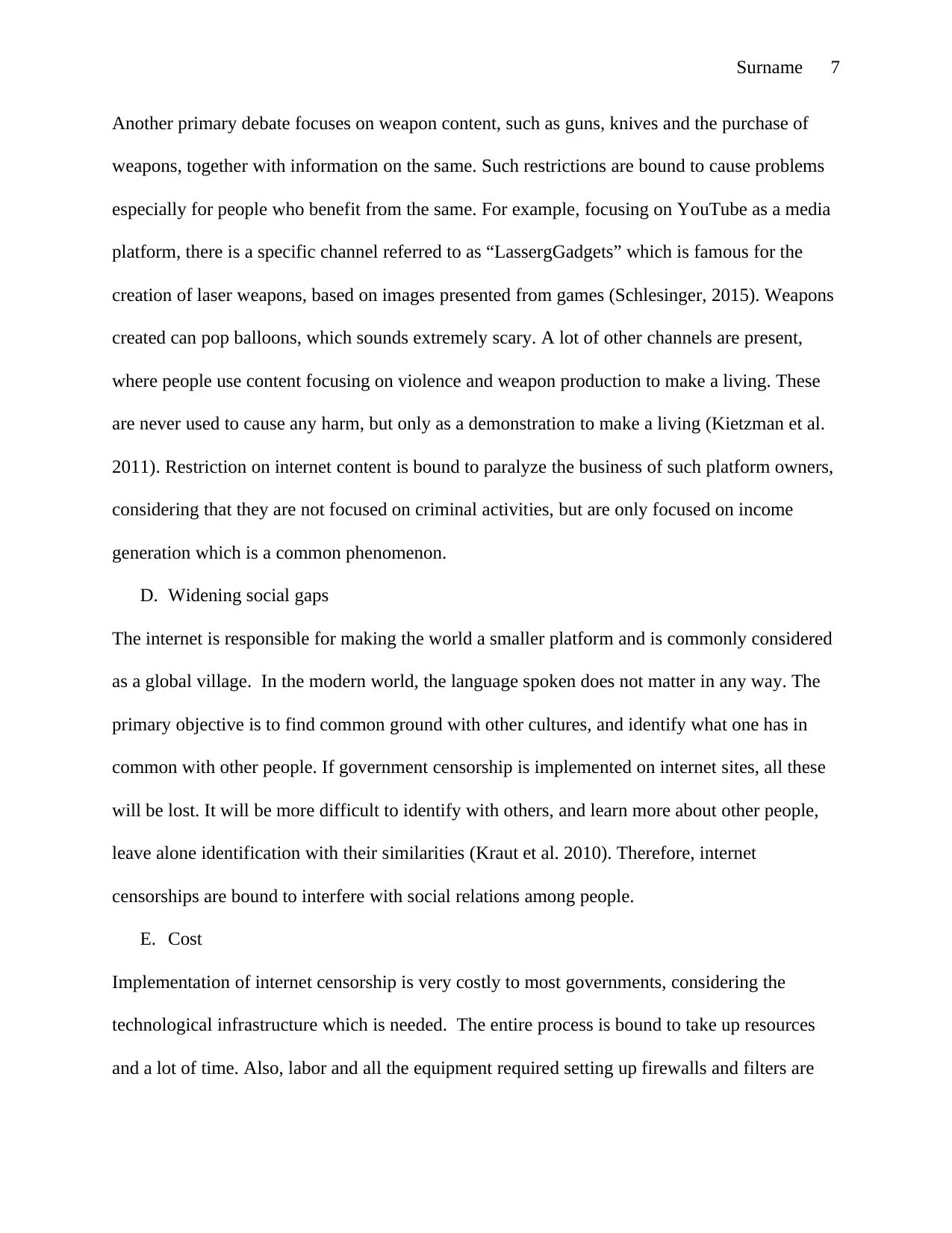
Surname 7
Another primary debate focuses on weapon content, such as guns, knives and the purchase of
weapons, together with information on the same. Such restrictions are bound to cause problems
especially for people who benefit from the same. For example, focusing on YouTube as a media
platform, there is a specific channel referred to as “LassergGadgets” which is famous for the
creation of laser weapons, based on images presented from games (Schlesinger, 2015). Weapons
created can pop balloons, which sounds extremely scary. A lot of other channels are present,
where people use content focusing on violence and weapon production to make a living. These
are never used to cause any harm, but only as a demonstration to make a living (Kietzman et al.
2011). Restriction on internet content is bound to paralyze the business of such platform owners,
considering that they are not focused on criminal activities, but are only focused on income
generation which is a common phenomenon.
D. Widening social gaps
The internet is responsible for making the world a smaller platform and is commonly considered
as a global village. In the modern world, the language spoken does not matter in any way. The
primary objective is to find common ground with other cultures, and identify what one has in
common with other people. If government censorship is implemented on internet sites, all these
will be lost. It will be more difficult to identify with others, and learn more about other people,
leave alone identification with their similarities (Kraut et al. 2010). Therefore, internet
censorships are bound to interfere with social relations among people.
E. Cost
Implementation of internet censorship is very costly to most governments, considering the
technological infrastructure which is needed. The entire process is bound to take up resources
and a lot of time. Also, labor and all the equipment required setting up firewalls and filters are
Another primary debate focuses on weapon content, such as guns, knives and the purchase of
weapons, together with information on the same. Such restrictions are bound to cause problems
especially for people who benefit from the same. For example, focusing on YouTube as a media
platform, there is a specific channel referred to as “LassergGadgets” which is famous for the
creation of laser weapons, based on images presented from games (Schlesinger, 2015). Weapons
created can pop balloons, which sounds extremely scary. A lot of other channels are present,
where people use content focusing on violence and weapon production to make a living. These
are never used to cause any harm, but only as a demonstration to make a living (Kietzman et al.
2011). Restriction on internet content is bound to paralyze the business of such platform owners,
considering that they are not focused on criminal activities, but are only focused on income
generation which is a common phenomenon.
D. Widening social gaps
The internet is responsible for making the world a smaller platform and is commonly considered
as a global village. In the modern world, the language spoken does not matter in any way. The
primary objective is to find common ground with other cultures, and identify what one has in
common with other people. If government censorship is implemented on internet sites, all these
will be lost. It will be more difficult to identify with others, and learn more about other people,
leave alone identification with their similarities (Kraut et al. 2010). Therefore, internet
censorships are bound to interfere with social relations among people.
E. Cost
Implementation of internet censorship is very costly to most governments, considering the
technological infrastructure which is needed. The entire process is bound to take up resources
and a lot of time. Also, labor and all the equipment required setting up firewalls and filters are
Paraphrase This Document
Need a fresh take? Get an instant paraphrase of this document with our AI Paraphraser
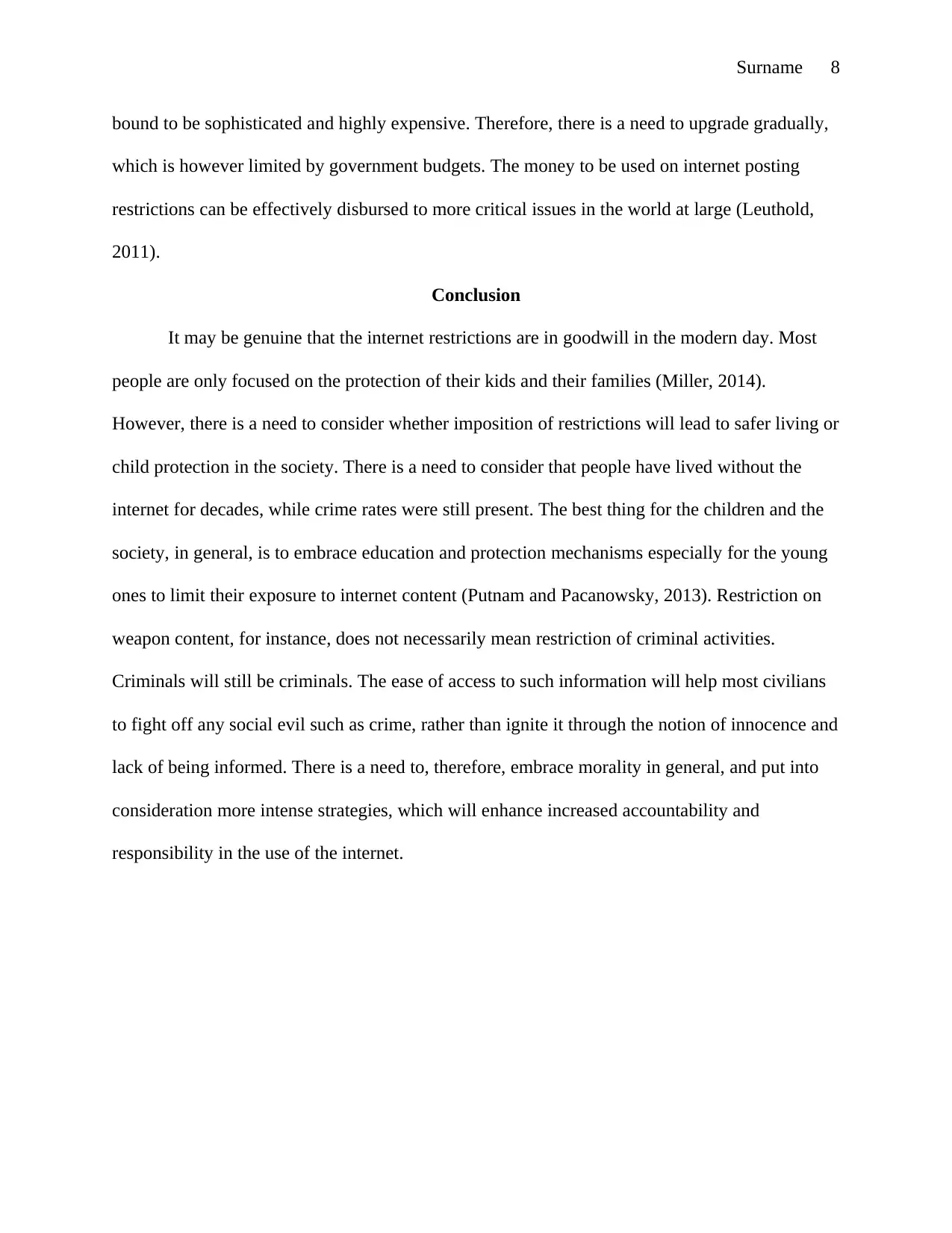
Surname 8
bound to be sophisticated and highly expensive. Therefore, there is a need to upgrade gradually,
which is however limited by government budgets. The money to be used on internet posting
restrictions can be effectively disbursed to more critical issues in the world at large (Leuthold,
2011).
Conclusion
It may be genuine that the internet restrictions are in goodwill in the modern day. Most
people are only focused on the protection of their kids and their families (Miller, 2014).
However, there is a need to consider whether imposition of restrictions will lead to safer living or
child protection in the society. There is a need to consider that people have lived without the
internet for decades, while crime rates were still present. The best thing for the children and the
society, in general, is to embrace education and protection mechanisms especially for the young
ones to limit their exposure to internet content (Putnam and Pacanowsky, 2013). Restriction on
weapon content, for instance, does not necessarily mean restriction of criminal activities.
Criminals will still be criminals. The ease of access to such information will help most civilians
to fight off any social evil such as crime, rather than ignite it through the notion of innocence and
lack of being informed. There is a need to, therefore, embrace morality in general, and put into
consideration more intense strategies, which will enhance increased accountability and
responsibility in the use of the internet.
bound to be sophisticated and highly expensive. Therefore, there is a need to upgrade gradually,
which is however limited by government budgets. The money to be used on internet posting
restrictions can be effectively disbursed to more critical issues in the world at large (Leuthold,
2011).
Conclusion
It may be genuine that the internet restrictions are in goodwill in the modern day. Most
people are only focused on the protection of their kids and their families (Miller, 2014).
However, there is a need to consider whether imposition of restrictions will lead to safer living or
child protection in the society. There is a need to consider that people have lived without the
internet for decades, while crime rates were still present. The best thing for the children and the
society, in general, is to embrace education and protection mechanisms especially for the young
ones to limit their exposure to internet content (Putnam and Pacanowsky, 2013). Restriction on
weapon content, for instance, does not necessarily mean restriction of criminal activities.
Criminals will still be criminals. The ease of access to such information will help most civilians
to fight off any social evil such as crime, rather than ignite it through the notion of innocence and
lack of being informed. There is a need to, therefore, embrace morality in general, and put into
consideration more intense strategies, which will enhance increased accountability and
responsibility in the use of the internet.
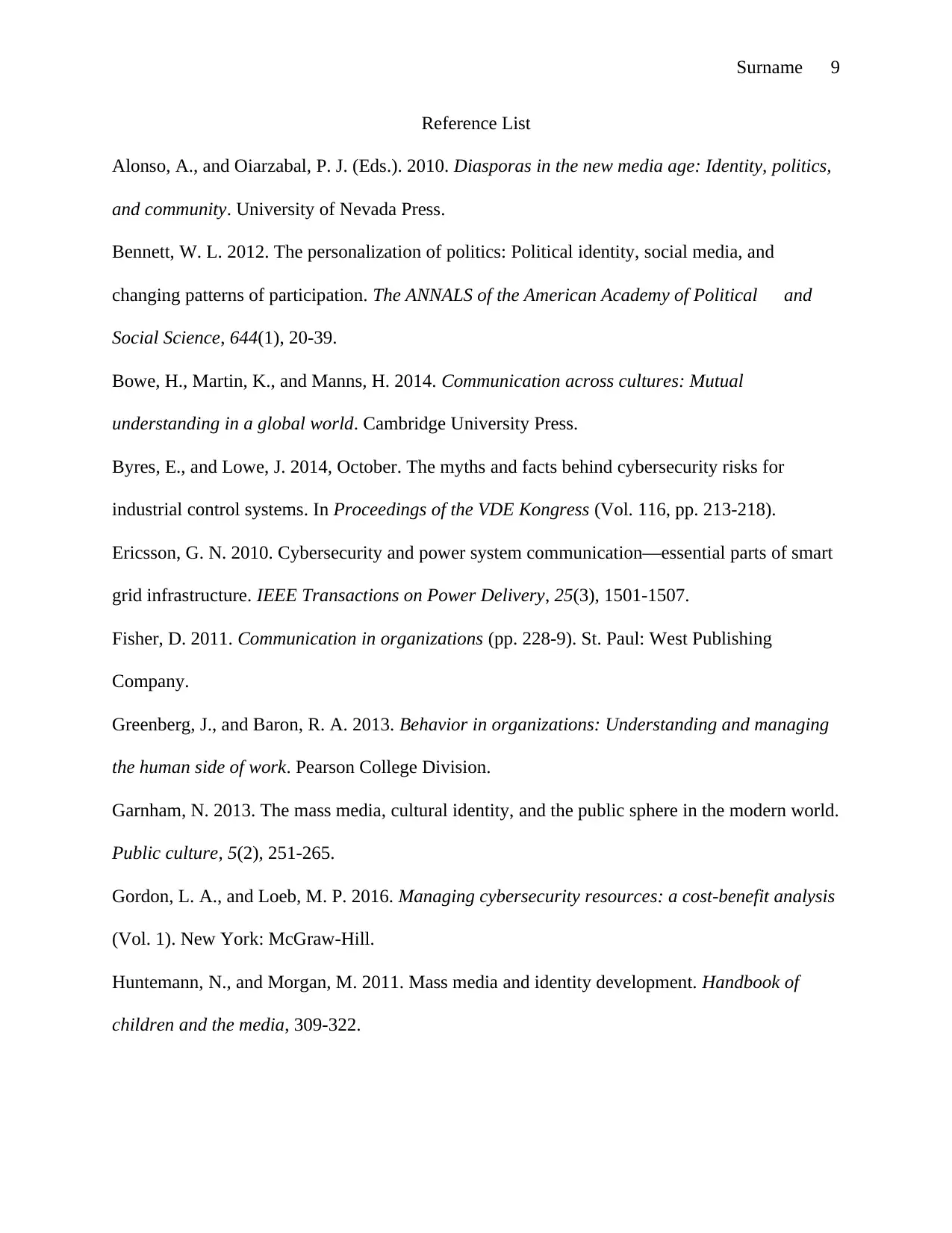
Surname 9
Reference List
Alonso, A., and Oiarzabal, P. J. (Eds.). 2010. Diasporas in the new media age: Identity, politics,
and community. University of Nevada Press.
Bennett, W. L. 2012. The personalization of politics: Political identity, social media, and
changing patterns of participation. The ANNALS of the American Academy of Political and
Social Science, 644(1), 20-39.
Bowe, H., Martin, K., and Manns, H. 2014. Communication across cultures: Mutual
understanding in a global world. Cambridge University Press.
Byres, E., and Lowe, J. 2014, October. The myths and facts behind cybersecurity risks for
industrial control systems. In Proceedings of the VDE Kongress (Vol. 116, pp. 213-218).
Ericsson, G. N. 2010. Cybersecurity and power system communication—essential parts of smart
grid infrastructure. IEEE Transactions on Power Delivery, 25(3), 1501-1507.
Fisher, D. 2011. Communication in organizations (pp. 228-9). St. Paul: West Publishing
Company.
Greenberg, J., and Baron, R. A. 2013. Behavior in organizations: Understanding and managing
the human side of work. Pearson College Division.
Garnham, N. 2013. The mass media, cultural identity, and the public sphere in the modern world.
Public culture, 5(2), 251-265.
Gordon, L. A., and Loeb, M. P. 2016. Managing cybersecurity resources: a cost-benefit analysis
(Vol. 1). New York: McGraw-Hill.
Huntemann, N., and Morgan, M. 2011. Mass media and identity development. Handbook of
children and the media, 309-322.
Reference List
Alonso, A., and Oiarzabal, P. J. (Eds.). 2010. Diasporas in the new media age: Identity, politics,
and community. University of Nevada Press.
Bennett, W. L. 2012. The personalization of politics: Political identity, social media, and
changing patterns of participation. The ANNALS of the American Academy of Political and
Social Science, 644(1), 20-39.
Bowe, H., Martin, K., and Manns, H. 2014. Communication across cultures: Mutual
understanding in a global world. Cambridge University Press.
Byres, E., and Lowe, J. 2014, October. The myths and facts behind cybersecurity risks for
industrial control systems. In Proceedings of the VDE Kongress (Vol. 116, pp. 213-218).
Ericsson, G. N. 2010. Cybersecurity and power system communication—essential parts of smart
grid infrastructure. IEEE Transactions on Power Delivery, 25(3), 1501-1507.
Fisher, D. 2011. Communication in organizations (pp. 228-9). St. Paul: West Publishing
Company.
Greenberg, J., and Baron, R. A. 2013. Behavior in organizations: Understanding and managing
the human side of work. Pearson College Division.
Garnham, N. 2013. The mass media, cultural identity, and the public sphere in the modern world.
Public culture, 5(2), 251-265.
Gordon, L. A., and Loeb, M. P. 2016. Managing cybersecurity resources: a cost-benefit analysis
(Vol. 1). New York: McGraw-Hill.
Huntemann, N., and Morgan, M. 2011. Mass media and identity development. Handbook of
children and the media, 309-322.
⊘ This is a preview!⊘
Do you want full access?
Subscribe today to unlock all pages.

Trusted by 1+ million students worldwide
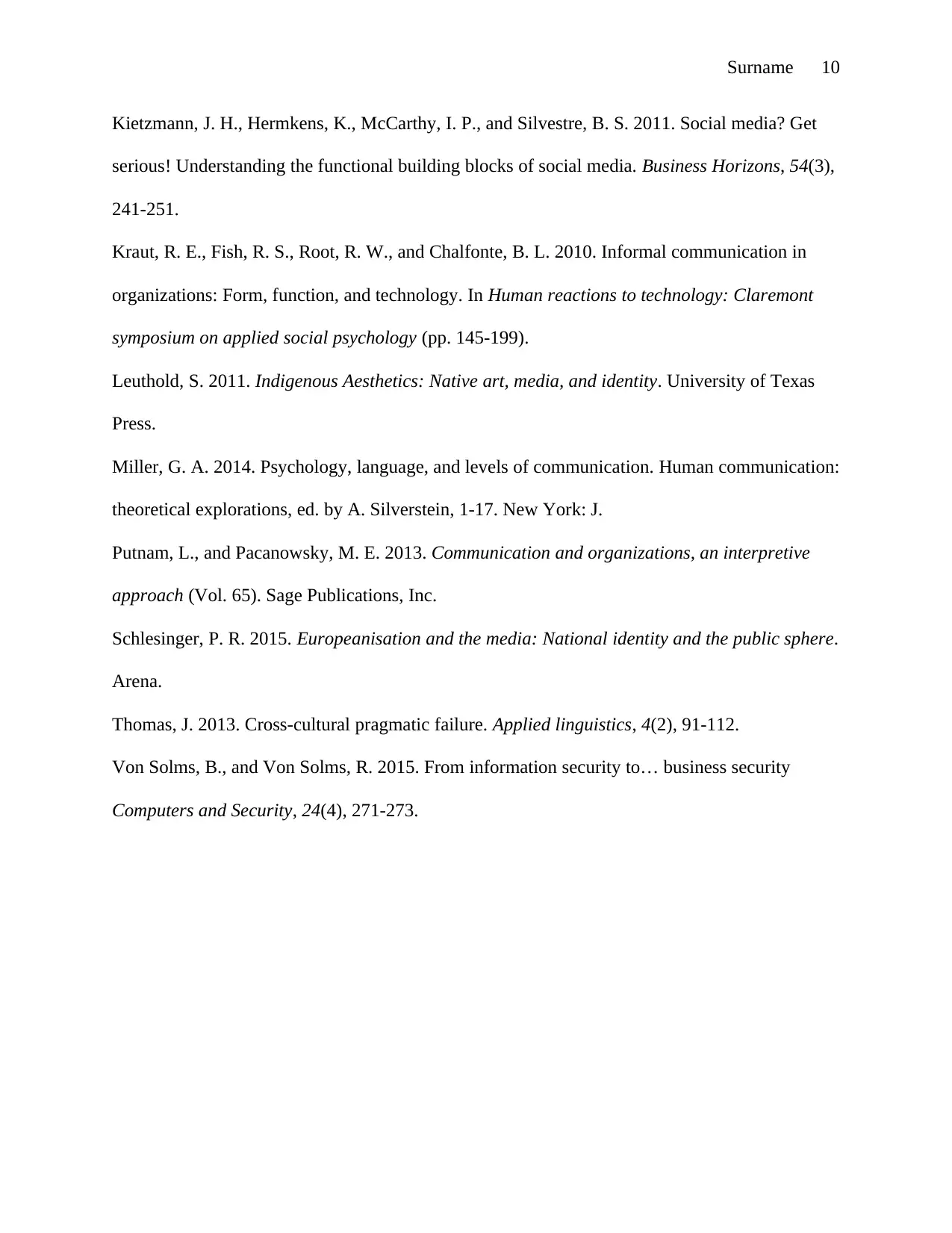
Surname 10
Kietzmann, J. H., Hermkens, K., McCarthy, I. P., and Silvestre, B. S. 2011. Social media? Get
serious! Understanding the functional building blocks of social media. Business Horizons, 54(3),
241-251.
Kraut, R. E., Fish, R. S., Root, R. W., and Chalfonte, B. L. 2010. Informal communication in
organizations: Form, function, and technology. In Human reactions to technology: Claremont
symposium on applied social psychology (pp. 145-199).
Leuthold, S. 2011. Indigenous Aesthetics: Native art, media, and identity. University of Texas
Press.
Miller, G. A. 2014. Psychology, language, and levels of communication. Human communication:
theoretical explorations, ed. by A. Silverstein, 1-17. New York: J.
Putnam, L., and Pacanowsky, M. E. 2013. Communication and organizations, an interpretive
approach (Vol. 65). Sage Publications, Inc.
Schlesinger, P. R. 2015. Europeanisation and the media: National identity and the public sphere.
Arena.
Thomas, J. 2013. Cross-cultural pragmatic failure. Applied linguistics, 4(2), 91-112.
Von Solms, B., and Von Solms, R. 2015. From information security to… business security
Computers and Security, 24(4), 271-273.
Kietzmann, J. H., Hermkens, K., McCarthy, I. P., and Silvestre, B. S. 2011. Social media? Get
serious! Understanding the functional building blocks of social media. Business Horizons, 54(3),
241-251.
Kraut, R. E., Fish, R. S., Root, R. W., and Chalfonte, B. L. 2010. Informal communication in
organizations: Form, function, and technology. In Human reactions to technology: Claremont
symposium on applied social psychology (pp. 145-199).
Leuthold, S. 2011. Indigenous Aesthetics: Native art, media, and identity. University of Texas
Press.
Miller, G. A. 2014. Psychology, language, and levels of communication. Human communication:
theoretical explorations, ed. by A. Silverstein, 1-17. New York: J.
Putnam, L., and Pacanowsky, M. E. 2013. Communication and organizations, an interpretive
approach (Vol. 65). Sage Publications, Inc.
Schlesinger, P. R. 2015. Europeanisation and the media: National identity and the public sphere.
Arena.
Thomas, J. 2013. Cross-cultural pragmatic failure. Applied linguistics, 4(2), 91-112.
Von Solms, B., and Von Solms, R. 2015. From information security to… business security
Computers and Security, 24(4), 271-273.
1 out of 10
Your All-in-One AI-Powered Toolkit for Academic Success.
+13062052269
info@desklib.com
Available 24*7 on WhatsApp / Email
![[object Object]](/_next/static/media/star-bottom.7253800d.svg)
Unlock your academic potential
Copyright © 2020–2025 A2Z Services. All Rights Reserved. Developed and managed by ZUCOL.
